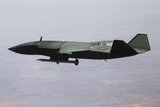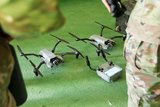US Army accepts first FARA helicopter engine prototype
The T901 will not only power the US Army’s FARA winner but will also replace the T700 engine currently used on all AH-64 Apache and UH-60 Black hawk helicopters. (Photo: Sikorsky)
The US Government has begun accepting deliveries of the Improved Turbine Engine Program (ITEP), paving the way for the maiden flight of the US Army Future Attack Reconnaissance Aircraft (FARA) prototypes.
The first General Electric (GE) T901 flight test (FT) engine has already been delivered, with the second engine undergoing the acceptance process. Both engines will be delivered to FARA bidders Bell and Sikorsky by the end of October 2023.
The companies were expected to take delivery of the T901 in the spring of this year, however, the engine has faced ‘manufacturing challenges’.
‘GE Aerospace initiated testing of the first T901
Already have an account? Log in
Want to keep reading this article?
More from Air Warfare
-
![Singapore Airshow 2026: Rafael highlights tailored effector solutions for different operational needs]()
Singapore Airshow 2026: Rafael highlights tailored effector solutions for different operational needs
Shephard spoke with Rafael’s CEO about the company’s effector offerings as well as his perspective on one-way attack drones.
-
![World Defense Show 2026: L3Harris to achieve full-rate production of Viper Shield soon]()
World Defense Show 2026: L3Harris to achieve full-rate production of Viper Shield soon
L3Harris has completed the production candidate software load for its Viper Shield airborne electronic warfare system and is conducting sea trials with its VAMPIRE counter-drone system.
-
![Singapore Airshow 2026: CCA manufacturers eye growing opportunities in Asia-Pacific]()
Singapore Airshow 2026: CCA manufacturers eye growing opportunities in Asia-Pacific
Companies offering collaborative combat aircraft say there is a massive potential for countries adopting the capability in the Asia-Pacific region.
-
![Singapore Airshow 2026: Saab eyes “share” in future fighter market, targets 2027 CCA demo flight]()
Singapore Airshow 2026: Saab eyes “share” in future fighter market, targets 2027 CCA demo flight
The Swedish government is expected to make a decision on the next steps of the Future Fighter System Concept programme by 2030, with the current second phase focusing on technology knowledge expansion and demonstration flights.
-
![Singapore Airshow: Red Cat ramps up portfolio development amid “key” APAC opportunities]()
Singapore Airshow: Red Cat ramps up portfolio development amid “key” APAC opportunities
In the wake of its 1,842% year-on-year revenue increase in Q4 2025, Red Cat sees mass opportunities in the Asia-Pacific region as the company eyes an ongoing production increase and market growth.
























